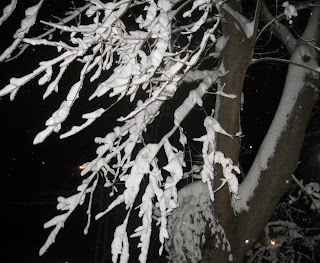I
am taking a drawing class. I have drawn and painted from as far back as I can
remember; dreams, gardens, faces, trees of every season—for the most part
unaware of what I was doing, outside of knowing it was not art.
Our
first lesson was on perspective, a technique for creating the illusion of depth
and spatial relationships on a flat surface. Our teacher introduced the terms
horizon line and vanishing point, showing us how through determining our
viewpoint, eye level on the paper, the angles of everything we represent can
fall in place.
The
drawing exercises I have been doing got me thinking about the word perspective,
from the Latin perspicere, to look closely at, to see through.
In
drawing what we see depends on from where we look. What is above the horizon
line reveals the bottom of an object, what is below the horizon line reveals
the top. What is to the right reveals the left and so on. If we sit on the
grass we see a tree through a child’s eyes.
A
memoir offers the reader the author’s perspective on parts of her story. Like a
drawing, it is a line in the sand.

As we move through life our horizons, our vanishing points may shift, and with them our perspectives, though a bowl of lemons remains a bowl of lemons, and an experience of love, what about that? Does that remain etched in the heart? No matter how or when we look at it.
We
may look at a dream or into a dream. We may speak of illusions. And suffer
them.
What
we see looking inward and looking outward, the relationships of things and
situations, whether in a dream, in a drawing, in a memoir, or in myriad forms
of relationship, speaks to who we are. Our perspectives on life, measured, shifting,
emotional, offer us mirrors that reflect our souls. Or so it seems to me.
From what perspective do you see things? And
there are so many.
(I will be away for a few weeks and will return to this blog once I am back.)








.JPG)

